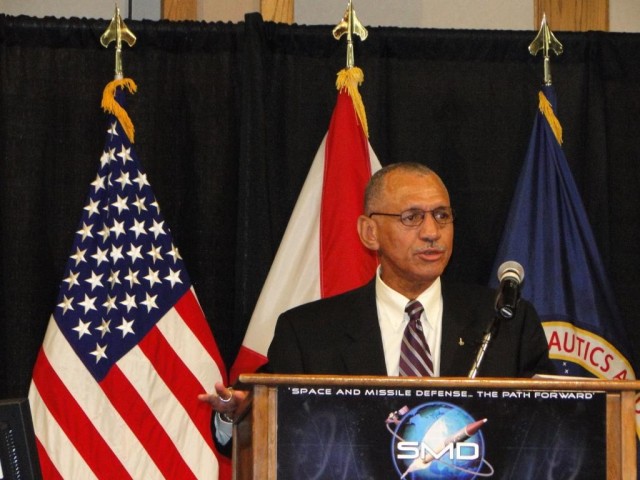NASA's new administrator wanted to get one thing clear when he spoke for the first time in front of a heavily military-oriented audience Aug. 19 at the 12th annual Space and Missile Defense Conference - DoD and NASA are not two very different agencies. "We do things differently," said Charles Bolden, a retired Marine Corps major general who served as a pilot in Vietnam and as a NASA astronaut. "But our space activities give us a common foundation. Whether you work for NASA or the Army, space is important to our nation. It is critical." With that out of the way, Bolden had another misconception to dispel concerning President Barack Obama's interest in space and space exploration. "He has a vision for space. He has very interesting thoughts of the future of space," Bolden said. "A lot of people are afraid of what's going to come out of the Augustine Commission (an advisory committee on the future of the nation's space mission). I'm not." Although he was not a member of the Augustine Commission, Bolden, who is the first African-American to lead NASA in a permanent position, said he would be at the briefing table when recommendations on the future of space exploration are written for the president. In week five of his position as NASA administrator, Bolden, 63, said NASA must asked the same questions DoD asks about its relevance to the needs of the nation. "We serve the nation. That's our customer. Our stakeholders are the president and Congress, but, most importantly, the American people." Bolden said based on his experience talking to young people there is a significant change in the number of students who aspire to be scientists, engineers and astronauts. Unfortunately, that change reflects a decline in interest in scientific and technology fields. "When I would visit schools in the '80s and '90s, I would ask students 'Who wants to be an astronaut'' Nearly every hand in the room would go up," Bolden said. "Now when I visit schools maybe two or three hands go up. We have to reach them. I want every hand in the room to go up." He has also seen that lack of interest in the young adults of America. "There is a huge voting portion of our community that doesn't resonate with NASA," Bolden said. "We must find ways to make what we do relevant." In part, because of the nation's military strength, Bolden said NASA is able to connect with the global community. "The military provides us with an umbrella of protection so we can build coalitions ... International partners are critical to success. We know whatever our future, chances are it will be better if we work with our partners," he said. He hopes those coalitions - both international and with industry -- will go a long way in promoting scientific efforts, particularly when they involve climate research, technology innovation and space exploration. Bolden went on to note Marshall Space Flight Center's significant role in the development of technology for space exploration, particularly the advanced rocket engine and life support work. He hopes the scientists and engineers at MSFC will continue to "make their mark" on space exploration, adding that he hopes these same scientists and engineers will find ways to encourage and mentor young people to take their places when they retire. "How do we develop the young pool of talented scientists and engineers so they want to work for NASA'" he asked, describing the decline in scientists and engineers in the U.S. as the "quiet crisis." Talking about the work of NASA being innovative, imaginative and fun, Bolden said "it's up to all of us to encourage students to follow a space and engineering path." Bolden spoke briefly of his own experience in space, which included piloting the Space Shuttle Columbia on STS-61-C, piloting Space Shuttle Discovery on STS-31, commanding a crew of seven aboard Space Shuttle Atlantis on STS-45 and commanding a crew of six aboard Space Shuttle Discovery on STS-60. "If you could go out in space you would see how fragile our world is and how important it is that we work together ... Humans are by nature explorers. We want to see what's on the other side of the hill. We want to know how things work. The universe is full of wonder that is available to everyone," he said.
NASA Administrator From the Few and the Proud
By Kari Hawkins, USAG RedstoneAugust 28, 2009


Social Sharing